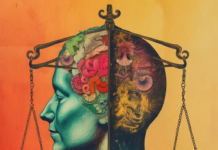In a recent article, psychiatry researcher Diogo Telles-Correia argues that the unexamined philosophical assumptions behind neuroscience research influence the way that studies are designed and interpreted. Telles-Correia, from the University of Lisbon Department of Psychiatry, argues that these unquestioned metaphysical positions are at the core of neuroscience’s failure to provide useful clinical research. He suggests that researchers actively investigate the philosophy of science that they operate within and question their assumptions about the mind-brain question.

The article, published in the Journal of Evaluation in Clinical Practice, focuses initially on the “mind-brain” gap. Telles-Correia writes that most neuroscience research contains the implicit assumption that the mind is synonymous with the brain, and that the mind is governed completely by discoverable, physical phenomena. However, he writes:
“There is no scientific method that proves that the mind can be reduced to the brain and that the laws that govern the mind are the same that govern the nervous system.”
Reductionism is the belief that any mental or emotional state can be simplified to its biological correlates. According to Telles-Correia, “reductionism is not a scientific attitude, but a metaphysical one.” Although reductionism is sometimes openly stated as the position of neuroscientific researchers, according to Telles-Correia, it is more often implied in the design of the research as well as in the way the findings are interpreted.
For example, researchers tend to design a test without questioning whether it truly represents the internal experience being studied, then interpret any detectable brain activity as being “related” to the test in question, and, finally, conclude that this brain activity therefore causes or is caused by the internal experience.
However, these assumptions do not take into account the meaning of the test, the actual internal experience, and the question of whether any brain activity associated with a mental state is causal. Telles-Correia points out that none of these underlying questions can be investigated using current neuroscience methodology. He presents research on trauma in neuroscience as an example:
“Although a traumatic event in childhood may have a translation at the level of brain biology, it does not mean that it is through neurosciences that these traumatic events can be best described and explored.”
Telles-Correia goes on to comment on findings of “neurobiological correlates” of psychiatric disorders. “Psychiatric disorders are ‘social constructs,’” he writes, “not natural kinds that exist independently of any human effort. The evaluation of what is or is not ‘pathological’ in psychiatry is related to 1) comprehensibility (whether or not the mental state/behavior is comprehensible given the sociocultural context of the patient, 2) adaptability (adaptive or non-adaptive in the context of the patient), and 3) connection to distress and disability (whether or not they cause distress or disability).”
He also notes that “it has not been possible to demonstrate the presence of natural borders between mental illness and normality.” That is, the lines separating a diagnostic “illness” and so-called “normal” mental states are vague, requiring the subjective judgment of an outside entity (such as a psychiatrist or neuroscience researcher). Therefore, he suggests that is not possible to find the neurobiological correlates of diagnosed disorders as compared to the neurobiology of so-called “healthy” controls.
Another issue arises in research attempting to discover the neural correlates of a particular psychiatric disorder. Psychiatric diagnoses are broad categories and individuals with the same diagnosis may have very different mental states. For instance, someone with the diagnosis of depression may sleep too much or too little or may overeat or under eat. In these cases, someone diagnosed with depression may have the opposite symptoms of another person diagnosed with depression.
Telles-Correia argues that future studies need to include experts from multiple fields, not just neuropsychiatric specialists. He suggests that experts in philosophy of science are necessary additions to neuroscience and psychiatric research teams.
****
Telles-Correia, D. (2018). The mind-brain gap and the neuroscience-psychiatry gap. Journal of Evaluation in Clinical Practice. doi: 10.1111/jep.12891 (Link)















The “mental health professionals” think their DSM disorders are much more complicated than they are. Today’s serious DSM “mental illnesses” are merely a naming of the illnesses and symptoms that can be created with the psychiatric drugs.
The ADHD drugs and antidepressants can create the “depression,” “bipolar,” and “schizophrenia” symptoms.
https://www.alternet.org/story/146659/are_prozac_and_other_psychiatric_drugs_causing_the_astonishing_rise_of_mental_illness_in_america
https://www.fda.gov/downloads/Drugs/DrugSafety/InformationbyDrugClass/UCM173233.pdf
https://en.wikipedia.org/wiki/Stimulant_psychosis
https://en.wikipedia.org/wiki/Toxidrome
The antipsychotics can create both the negative and positive symptoms of “schizophrenia.”
https://en.wikipedia.org/wiki/Neuroleptic-induced_deficit_syndrome
https://en.wikipedia.org/wiki/Toxidrome
As to why over 80% of those labeled as “depressed,” “anxious,” “bipolar,” or “schizophrenic” are actually child abuse victims. And over 90% of those labeled as “borderline” are child abuse victims.
https://www.madinamerica.com/2016/04/heal-for-life/
This is because the DSM classifies child abuse as a “V Code,” and the “V Codes” are NOT insurance billable disorders. Thus, in order to get paid, the “mental health professionals” MUST misdiagnose child abuse victims with the billable disorders, prior to “helping” them.
https://www.psychologytoday.com/us/blog/your-child-does-not-have-bipolar-disorder/201402/dsm-5-and-child-neglect-and-abuse-1
The reality is that the DSM disorders are iatrogenic illnesses that can be created with the psychiatric drugs. The DSM disorders do NOT have “genetic” etiologies, that is an incorrect assumption by the psychiatric community. And today’s so called “mental health industry” is actually a multibillion dollar, primarily child abuse covering up, industry, by design.
From a philosophical perspective, it is unwise for a society to have a multibillion dollar, iatrogenic illness creating, primarily child abuse covering up, group of “mental health” industries. Because these child abuse silencing industries are also functioning to aid, abet, and empower the child abusers. And this has helped lead to huge human trafficking and pedophilia problems in Western civilization, according to world leaders.
https://www.nytimes.com/2018/04/11/us/backpage-sex-trafficking.html
http://www.social-consciousness.com/2017/07/putin-west-controlled-by-satanic-pedophiles.html
Report comment
The vast majority of us were driven bonkers by the drugs supposed to cure our suffering. A few were gaslighted like you Someone Else. Others took an SSRI for depression or some off label problem and were sucked down, down, down…into the Mental Illness Inferno.
Report comment
I need to understand this better…..there is neuroscience research on the relation between the microbiome and the central nervous system…what does philosophy have to say about that type of research…
Report comment
Philosophy transcends scientific investigations, in fact, science is a tiny subset of philosophy. Philosophy doesn’t ask the question, “what’s the relationship between the microbiome and the CNS?” It asks questions like, “What is a human being? What is consciousness? Is our awareness a result of our body or are we beings who become aware of the body? Who or what makes the decisions that tell our bodies what to do? Are feelings a function of body, spirit, or the interaction of them? What IS spirit? Do we HAVE a spirit, or ARE we spirits that HAVE bodies?
Psychiatry runs on the philosophical assumption that we are bodies and that our minds are a result of brain activity, and they conclude therefore that the only solution to altering the mind is altering the brain. That’s “materialist reductionism” from a philosophical viewpoint (or some such name). What they don’t tell you is that there is no SCIENTIFIC reason to believe in reductionism any more than there is to believe in spiritual implantation at birth. The reality is that Science has NO answer as to what the human mind really is or where it comes from. These are questions for philosophy, because they transcend the questions of material reality.
Report comment
Science is not truth, science is a method for arriving at the truth. Science exists, not to prove, but to disprove. Scientists should be open minded when it comes to research, and it’s here that psychiatric research errs. Although they may wear lab-coats and peer through microscopes, bias, together with cherry picked study results, aren’t very conducive to scientific inquiry. You’re missing here studies to test hypotheses that the orthodoxy doesn’t approve. In other words, rather than scientific inquiry, what we’ve got are people with trick decks of cards and loaded dice.
Philosophy is more speculative. Broader. Able to ask questions that are, as yet, beyond the scope of anything ascertainable by the scientific method. Ethics are a part of it, too. Philosophy, that is. Something you don’t get when scientific research is at the mercy of the highest bidder, and where theories that don’t have financial backing, are not investigated and explored.
Report comment
“Reductionism is the belief that any mental or emotional state can be simplified to its biological correlates.”
I am not, a man is not, reducible to an effect from (my) his microbiomes, there, everything in its place, the central nervous system unruffled, no problem.
Report comment
Yes. Reductionism is anti-religious at its heart. Most churches don’t realize how reductionist psychiatry is by its nature.
Because of how “spin” has created the myth of reductionism for madness and human behaviors I’m unusually skeptical about the claims for AI. Quite likely they are inflated too.
“I’m a robot who doesn’t have any feelings. Sometimes that makes me really sad,” says Bender on Futurama.
Report comment
“Most churches don’t realize how reductionist psychiatry is by its nature.” Most churches are in bed with these “materialist reductionists” because the “mental health professionals” have been covering up the “zipper troubles” of the paternalistic religions for decades. An ethical pastor confessed to me that this is known as “the dirty little secret of the two original educated professions.”
Report comment
Wihout phenomenology of the psyche there’s no psychological reality and witout psychological reality there is no humanity. Everyone should read at least Revisioning of psychology and Manufacture of madness. Without knowledge about roots of the psychiatry and ideologies behind it, people never find out what is going on in authoritarian games. People do not even know what is psyche, they think it is a brain and this is disaster. There is higher mythical reality and people disregard this kind of reality, because it has got no connections with science. Another, ego Apollonian fundamentalism trap. There is a logic and truths about human nature in myths and real and logic connections between myths and life , because myth is language that psyche speaks, and psyche do not speak through science. We are destroying more sophisticated forms of knowledge because of scientism religion. I do think that psychiatry is destroying state the same way inquisition did and that everything which is based on DSM including pseudo biological model of psyche, is in reality, destroying the real state – human state, which construction is unknown now, because of false ideologies destroying humanity and I blame for this the shallow traits of apollonian ego and theology which destroy truths about psyche. The power of theology over human psyche is extremely destructive.What’s more i think that state can not be called state if psyche is seen as human enemy or illness. This is just a form of parasites reality, it is fake and unreal. We see our psyche through distorted narrow ego apollonian lens. And apolonian ego knows no empathy, its perspective is too shallow and arrogant towards the deeper psychological reality.
Report comment
To go higher and evolve means to change pseudo brain BS into the sometimes cruel reality of psyche without theological hypocrisy. To change cowardice and lies of pseudo medicine into psychological truths, even if that hurts a lot and we lose hope. (hope is theological) Because people must grow up and this is impossible if psychiatry exists. And psychiatry and apollonan ego claims and its main interests makes people childish, immature, stupid, small. Psyche makes them geniuses in their own unique kind, and psychiatry destroy the greatness of human psyche.
Genius means : from Latin, ‘attendant spirit present from one’s birth, innate ability or inclination’, from the root of gignere ‘beget’. The original sense ‘spirit attendant on a person’ gave rise to a sense ‘a person’s characteristic disposition’
——–and now Apollonian ego BS——–
which led to a sense ‘a person’s natural ability’, and finally ‘exceptional natural ability’ (mid 17th century).——–
this is how they started a invisible war with the human PSYCHE, HA!
Report comment
I had a rather rude psychiatrist that I just left tell me that the media is lying when it says the brain is still a mystery. He said in their profession they have access to research that isn’t published on the internet and sometimes years before it goes public, and he said some is still not public because it was ‘too controversial’, though why he would think it was OK to spill the beans about it if he knew that is one thing that left me skeptical. He said the brain is already fully understood and they have disproved the soul and any other kind of non-reductionist explanations. When I asked him how he knew, he hesitated for a bit and told me he had never seen it done in action but just heard it from colleagues but that they were ‘reliable’. And he said they can change your beliefs (with brain technology) which means they could make you stop believing in God or whatever else. He often brought it up when I was questioning the profession and its truthfulness, since he was the more cold and disconnected kind of psych, laughing when you tried to describe your current feelings or just giving you an apathetic “yeah, OK”, telling me I probably had a low or average IQ during a casual conversation (then laughing about it), etc. which may have influenced his attitude. That, and he had a prejudice against our religious beliefs when he tried to deprogram me and my father, and said we should commit suicide if losing our beliefs caused us too much grief. He also said if we have to go back to destructive behaviors that our faith helped us recover from, then we will just have to go back to them or again, commit suicide. And he said he could proscribe medicines for it if we wanted, to encourage us to believe in the power of medication as the answer to suffering. He said there isn’t much you can do, that most therapies including mindfulness, behavioral therapy, and others do very little and your capacity is entirely determined by brain matter and genes, and that the only solution was to take drugs, and deal with it, or commit suicide. He was pretty blunt and very cold. Now tell me, is this another trick of psychiatrists to claim they have access to more information than they really do, or is there any truth to the idea of this kind of mind-blowing confidential stuff being known to psychs? I am skeptical of what he has said because it sounds like he was playing mind games.
Report comment
Rhino: you already know the answer , it’s BS and it is the psychiatrists foremost speciality – they really aren’t very good at science, and are clueless on things like statistics.
Our NHS psychiatrist was very keen on the mind being purely biological “it’s not controversial at all that I can medicate away your disordered thoughts”, “it’s most important that you hang on to the idea that this is 100% biological, not a psychological problem but a serious psychiatric illness”. I thought he was trying to make people better not preach codswallop , but oh well. Can’t believe we pay taxpayer money to idiots like this.
Report comment
I find this to be true:
https://digest.bps.org.uk/2015/01/12/psychologists-and-psychiatrists-feel-less-empathy-for-patients-when-their-problems-are-explained-biologically/
Report comment